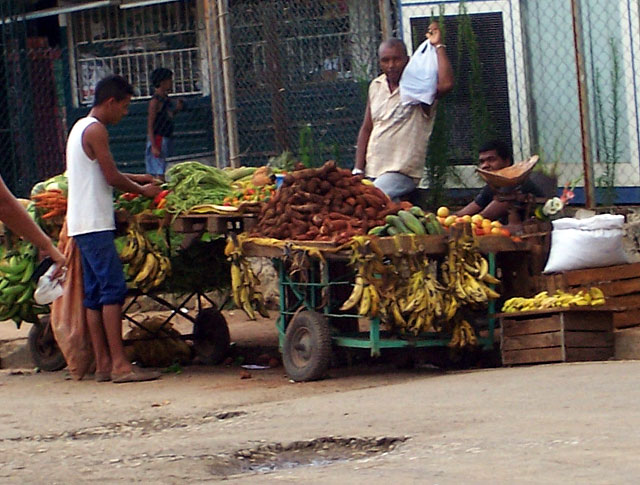
They say God can write straight with crooked lines. I would say that, in Cuba’s case, we should sign God up for a crash course in calligraphy. We have had a half-century of crooked lines and nothing indicates that they will straighten out. Adding to the confusion, the more talk there is in the official press about “clarity and transparency,” the more muddled the waters become. Still, some wonder naively when they will apply all the guidelines of the Sixth Congress of the CCP, as if they constituted a kind of spell that might turn the chaos and poverty into order and prosperity. Fourteen months after the quasi-secret meeting of the Druids, we continue to move ahead into the abyss envisioned by the boy promoted to captain of the rickety vessel, whose DNA, by the grace of some coincidence, matches his predecessor’s,
So here we have a “reformist president” whose innovations have only managed to further thin the social climate and emphasize the life of those supposedly benefitting by the reforms, such as the people. Among the better known reforms of the new octogenarian occupying the olive green throne, for example, is the liberalization of the sale of agricultural products by street vendors, known as the elegant term of “street cart operators”, duly certified licensed to carry out their duty. The sellers were to increase the variety of produce offered to the starving city dwellers, which they in fact have done, and, in turn, result in lowering prices that would enable ordinary people to raise their nose half a centimeter over the level of insolvency that is choking them.
But the latter has not happened for many reasons (or better yet, for lack of reasons) among them, the high taxes implied obstacle, and the countless fines whose minimum amount is 500 pesos of the so-called “national currency” (CUP) applied by a diligent team of state inspectors for any minor infractions or suspected infractions, such as, for instance, keeping the cart on one spot for too long (not defining how long), for not being able to give an explanation as to the origin of the cart or even the source of the wheels of the aforesaid device used by the operator. As a result of these and other obstacles the “signal” of prosperity sent out by the elusive president has only meant less buying power for the people and a larger number of corrupt individuals… I mean, “inspectors”.
The most sarcastic thing is that many foreign friends who visit us perceive the proliferation of vendors and small businesses as a sign of prosperity and not as the screen hiding the battle that takes place behind the scenes: the proto-entrepreneurs struggling to survive and advance, and the authorities intent in preventing prosperity and the revival of a truly independent middle class. The cat and mouse, now licensed to keep up the appearance of legality of some, and of good intentions of the others. Behold, the government has achieved a new source of income: legitimizing the potential crime and charging for the inevitable violations. It’s twisted and perverse, but its brilliance cannot be denied.
The opening of private ownership kiosks has also brought about another problem it was supposed to solve. The absence of wholesale markets and the instability of the supply of any product in the retail market have resulted in an incredible imbalance in some of their prices. To mention just one example, in recent weeks, purchasing a cloth to clean floors has become an unattainable dream for more modest budgets.
The product, already priced at an altered 0.90 CUC (equivalent to 21.6 pesos CUP) suddenly disappeared from the stands at the stores selling only in dollar currency (TRD). Right now, they can only be found at 40 pesos CUP among licensed and unlicensed street vendors, that is, twice their official price.
It turns out that the guidelines also announced a crusade against corruption and illegal activity, which means they are seeking to wipe out the people of Cuba completely. Because, who doesn’t constantly violate the law in this country, starting with the government itself? What common Cuban can survive, if not on the fringes of the law? Raise your hand if you haven’t bought anything on the black market –groceries, medicine, cleaning or office products or anything else, even a place to live, a car, an airplane ticket…
Stand up if any of you has not bribed an official in any capacity to get some benefit, from a ETECSA telephone line to the promise of a job, college registration, dentures or surgery? Who has not rented movies in underground places or played the numbers in a similarly underground place? And in Cuba, even boarding a bus through the back door is a crime. So it’s not unusual that lately the official press has been reporting an avalanche of violations being detected by the Comptroller of the Republic, except that these purges, rather than marking the end of impunity, are uncovering the uncontrollable and irreversible corruption of the system from top to bottom
There still seems to be a long stretch to cancel the dual currency, another promise of the April 2011 conclave of Communists, and for the implementation of the much-publicized -and expected- emigration reforms, always being postponed or in a “study” phase (of which our leaders are a bit slow on the uptake). Many other delayed promises have been bulking up the lack of credibility in the government, suggesting that there will be no real changes as long as they are proposed by the government. In short, it is obvious that all the eternal dictators are seeking is to gain time… and we’re giving it to them. In reality, we don’t need guidelines but rights, and those are not included in the depressing package of government measures.
Translated by Norma Whiting
June 11 2012
